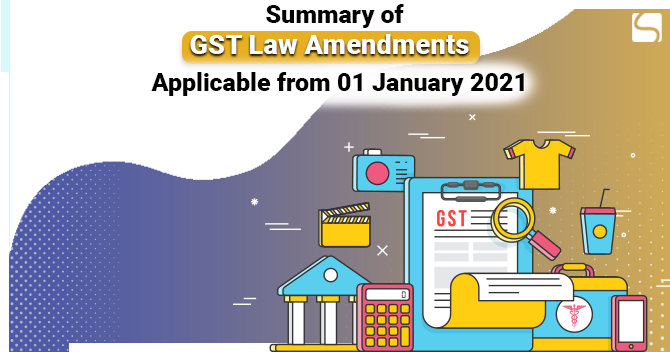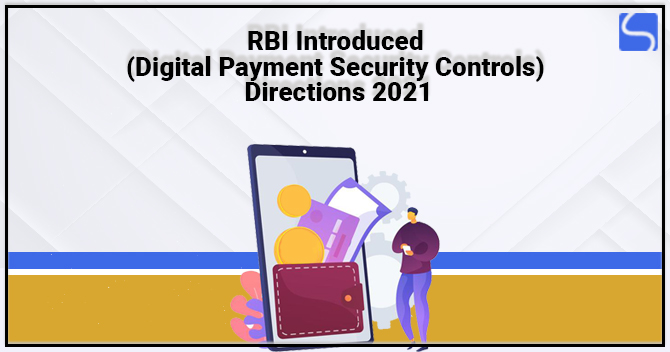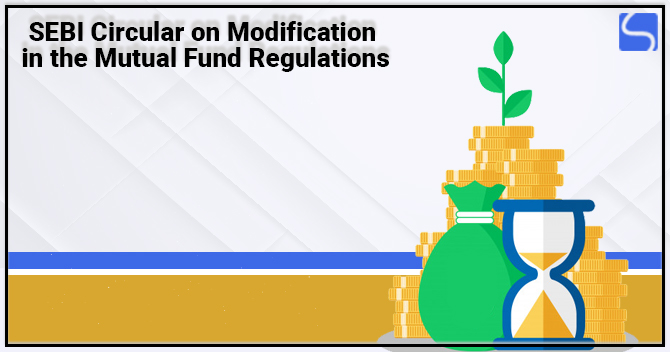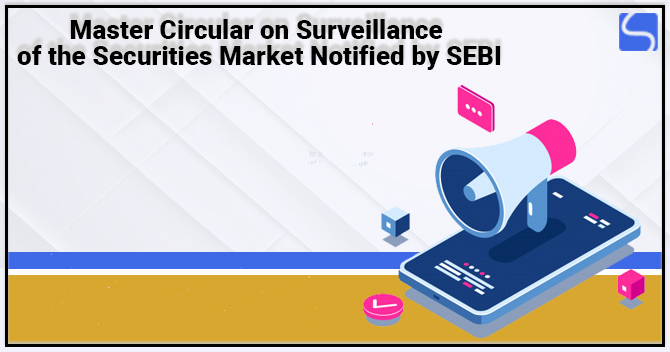Summary of GST Law Amendments Applicable from 01 January 2021

Shivani Jain | Updated: Jan 22, 2021 | Category: GST, News
“Coming Out of Comfort Zone”, this could be the best name for the Financial Year 2020. In this year, we have seen a series on amendments in each law, starting from Companies Act 2013, Finance Act to GST Law. The key GST Law Amendments include E-Invoicing, Implementation of QRMP Scheme, GSTR 2B, Changes in GST Returns, New Process to obtain GST Registration, Auto population of GSTR 3B, etc.
However, recently, by way of Notifications 92/ 2020 and 94/ 2020, dated 22.12.2020 each, CBIC has introduced certain amendments which will affect the provisions of GST Law.
Further, the Notification No 94/ 2020, dated 22.12.2020 deals with the amendments specifically made in GST Law. But the Notification No 92/ 2020, dated 22.12.2020 deals with the amendments made in Finance Act 2020, which will have an impact of GST Law as well.
In this blog, we will discuss in detail about the GST Law Amendments made by way of Notifications 92/ 2020 and 94/ 2020.
Table of Contents
GST Law Amendments by way of Notification No 94/ 2020
The 6 GST Law Amendments made by CBIC (Central Board of Indirect Taxes and Customs) by way of Notification No 94/ 2020 are as follows:
Restriction on claiming more than 5% ITC on Missed Invoices
CBIC by way of Notification No 94/ 2020 has amended the provisions of Rule 36 (4) of the Central Goods and Services Tax (Fourteen Amendment) Rules 2020. Further, as per the amendment made, a registered person is eligible to claim only 5% ITC (Input Tax Credit) for the invoices or debit notes furnished by suppliers. Earlier, the said limit was fixed at 10%.
Mandatory Payment of 1% Tax by Cash
A new rule 86 B has been introduced by CBIC in the Central Goods and Services Tax (Fourteen Amendment) Rules 2020. This particular rule states that a registered taxpayer is not eligible to discharge off his/her liability in excess of 99% by utilising ITC (Input Tax Credit). That means in such a case, the taxpayer needs to pay off his/ her 1% liability only by way of cash.
However, such a restriction is applicable to only in those cases where the total value of the taxable supply (other than zero-rated supply and exempt supply) is more than Rs 50 lakhs.
Also, there are some exceptions to this rule, which are as follows:
- If in case the said person is either of the following mentioned and has paid more than Rs 1 lakh as income tax for the last two financial years for which the period to file the return has expired:
- Sole Proprietor;
- Karta;
- Managing Director (MD);
- Partner;
- Whole time Director;
- Members of Managing Committee of Trust; or
- Members of Managing Committee of Associations;
- In case the registered taxpayer has received a refund of more than Rs 1 lakh in the previous financial year. Such a refund must be in regard to the unutilized ITC on zero rated supplies, i.e., exports + SEZ;
- In case the registered taxpayer has received a refund of more than Rs 1 lakh in the previous financial year. Such a refund must be in regard to the unutilized ITC on Inverted Rate Structure;
- If the registered person has paid off his/ her liability by way of electronic cash ledger for an amount of more than 1% of the total liability in the current financial year;
Cancellation of GST Registration
CBIC has amended the provisions of Rule 21 of the Central Goods and Services Tax (Fourteen Amendment) Rules 2020. Now, as per the amended provision, GST Registration of a person can be cancelled in situations as follows:
- If in case he/she avails of ITC in violation of the provisions of section 16;
- If in case he/she furnishes the details of outward supplies in Form GSTR 1 for more than one tax periods, which is in excess of the total outward supplies declared by him/ her in Form GSTR 3B for the said tax period;
- In case he/she violates the provisions of Rule 86 B;
Provisions concerning New GST Registration
CBIC has amended the provisions of Rule 8 and 9 to provide for the “Biometric Verification” for the applicants for New GST Registration. Moreover, the period for granting GST Registration has been increased from 3 to 7 days.
However, if in case a person fails to undergo the required Biometric Verification, then, in that case, the registration will be granted for a tenure of 30 days instead of 7 days. Further, a similar process will be applicable to the additional place of business.
Restriction in Filing Form GSTR 1
CBIC has amended the provisions of Rule 59 to not allow a taxpayer to file Form GSTR 1 in either of the cases as follows:
- If he/she has not filed the GST Return in Form GSTR 3B for the previous two months;
- If he/she has not filed the GST Return in Form GSTR 3B for the previous tax period;
- If he/she requires to pay off 1% of the total liability by cash and has not submitted the return in Form GSTR 3B for the previous tax period;
Reduction in the Validity of E way Bill
This amendment deals with the curtailment of travel time by 50%. That means as per the new e-way bill provision, now only one day validity will be granted to cover a distance of 200 km, which was earlier fixed at 100 km.
Link to Official Notification passed by CBIC[1]
GST Law Amendments by way of Notification No 92/2020
The key amendments made in the Finance Act 2020, which will have an impact on GST Law as well are as follows:
Composition under GST Law
The main reason behind the amendment of the provisions of section 10 (2) of the CGST Act 2017 was to provide that a person who is seeking registration under GST Composition Scheme must not be engaged in the supply of any activity or service on which tax is not leviable, or in any interstate outward supplies, or in making supplies by way of electronic commerce operator (who needs to collect TCS).
ITC on Debit Note
By way of this notification, CBIC delinks the availment of ITC (Input Tax Credit) on debit notes with the issuance date of the original invoice. Therefore, it shall be relevant to note that the ITC on debit notes which are issued after 6 months from the end of the fiscal year to which invoice relates can be availed post amendment as well.
Suspension of Voluntary Registration
CBIC has amended the provisions of section 29 (1) of the CGST Act 2017 to provide that a person who has obtained voluntary registration is eligible to opt for the cancellation of such registration as well. However, the same is possible only if the said person does require mandatory registration under either of the sections as follows:
- Under section 22 (on crossing the set threshold);
- Under section 24 (cases which require compulsory registration);
Extension for Filing the Application for Revocation
The reason behind the amendment in section 30 (1) of the CGST Act 2017 is to provide that the Additional or Joint Commissioner can extend the time limit for filing the revocation application by 30 days, if the taxpayer is able to provide a sufficient cause for delay. Further, the commissioner has the power to extend to the said limit by further 30 days.
Tax Invoice concerning Supply of Services
As per the amended section 31 (2) of the CGST Act 2017, the government will have the power in respect of the categories of supplies or services to which a tax invoice will be issued. Further, the government will have the power with regard to the time limit and manner within which such an invoice will be issued.
Issuance of TDS Certificate
The provisions dealing with the issuance of TDS Certificate and its consequences will now be regulated by the delegated legislation, i.e., by way of rules. Therefore, the said provisions are being omitted form the Finance Act 2020.
Beneficiaries of Fake Invoicing
A new sub section (IA) has been introduced under the provisions of section 122. As per this sub section, any person who retains profits in either of the following transactions shall be held liable to pay an amount which will be equivalent to the amount of tax evaded or ITC (Input Tax Credit) availed of or passed on:
- If in case he/she supplies any good or service without the issuance of invoice or issues an incorrect invoice with respect to such a supply;
- If in case he/she issues an invoice or bill without a valid supply of good or service or violates the provisions of the prescribed rules or act;
- Utilizes or takes ITC (Input Tax Credit) without the actual receipt of goods or service or both, either partially or fully, in violation of the provisions of the Act or rules made thereunder;
- Takes or distributes ITC in violation of the provisions of section 20 of the Act or the rules made thereunder;
Paragraph 4 of Schedule II
Normally, schedule II is just a classification and does not conclude whether a said transaction will be considered as supply or not. Further, paragraph 4 of the schedule II states that the transfer or disposal of those goods that are not forming part of the business assets will be deemed as supply of good, even though such a transfer or disposal is for consideration or not.
In the same manner, if the goods that were kept for the business purpose are put into any private use or made available to any person for an use other than business, then, in that case, such usage will be treated as supply of services, even though such is without any consideration.
Link to Official Notification passed by CBIC[2]
GST Compliance Calendar for January 2021
The GST Compliance Calendar for the month of January 2021 can be summarized as:
|
Due Date of Filing |
Return or Compliance |
Remarks |
|
31.12.2020 |
GSTR 9 or 9C (F.Y.2018 to 2019) |
Last Date for GST Audit and Annual Return |
|
31.12.2020 |
GSTR 9A |
Annual Return for the Composition Taxpayers |
|
07.01.2021 |
TDS (Tax Deducted at Source) or TCS (Tax Collected at Source) Payment- IT |
The Due date for the Payment of TDS or TCS for the month of October 2020 |
|
11.01.2021 |
GSTR1 (for the month of October 2020) |
Return of Outward Supplies in Monthly Return |
|
12.01.2021 |
GSTR 2B (for the month of October 2020) |
Auto Drafted ITC (Input Tax Credit) Statement available for download |
|
15.01.2021 |
TCS Return- IT |
Quarterly TCS Return under the Income Tax |
|
20.01.2021 |
GSTR3B (for the month of October 2020) |
Last Date for making Payment of Tax and Return by the taxpayers who are having an Annual Turnover of more than Rs 5 crores |
|
22.01.2021 |
GSTR3B (for the month of October 2020) |
Last Date for making Payment of Tax and Return by the taxpayers who are having an Annual Turnover of less than Rs 5 croresand having Principal Place of business in either of the following: a) Chhattisgarh; b) Madhya Pradesh; c) Gujarat; d) Daman and Diu; e) Dadra and Nagar Haveli; f) Maharashtra; g) Karnataka; h) Goa; i) Lakshadweep; j) Kerala; k) Tamil Nadu; l) Puducherry; m) Andaman and Nicobar Islands; n) Telangana; and o) Andhra Pradesh; |
|
24.01.2021 |
GSTR3B (for the month of October 2020) |
Last Date for making Payment of Tax and Return by the taxpayers who are having an Annual Turnover of less than Rs 5 croresand having Principal Place of business in either of the following: a) Jammu and Kashmir; b) Laddakh; c) Himachal Pradesh; d) Punjab; e) Chandigarh; f) Uttarakhand; g) Haryana; h) New Delhi; i) Rajasthan; j) Uttar Pradesh; k) Bihar; l) Sikkim; m) Arunachal Pradesh; n) Nagaland; o) Manipur; p) Mizoram; q) Tripura; r) Meghalaya; s) Assam; t) West Bengal; u) Jharkhand; and v) Odisha; |
|
31.01.2021 |
TDS Return- IT |
Quarterly TDS Return under the Income Tax |
Conclusion
In a nutshell, the main reason behind the continuous amendments made by the authorities in the ambit of GST Law is to curb and reduce the menace of fraudsters who benefits and pass on the available ITC (Input Tax Credit) by the help of fake and fly-by firms.
Further, in case of any other doubt or confusion concerning GST Law Amendments or any other related issue, reach out to Swarit Advisors or experienced and proficient CAs and CSS are there to cater to all your needs and queries.














